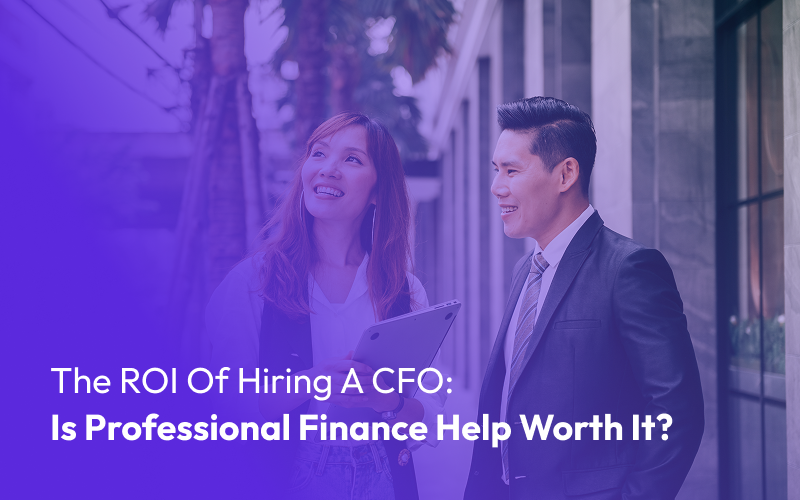You’ve crossed the million-dollar mark, but somewhere between managing payroll, forecasting cash flow, and trying to make sense of your margins, you’ve hit a wall. It suddenly becomes unclear how you can sustain your business’s momentum without burning out or burning through cash.
This is the point when you realize that juggling finance on your own is no longer enough. You need to bring in professional financial leadership to make the numbers make sense.
You need a strategic direction to follow through your wins.
However, you’re also asking yourself: Will hiring a CFO bring enough value to justify this investment?
I get where you’re coming from. A CFO, especially the ones who work full-time, comes with a high price tag after all.
To help you decide, let’s go through the value of hiring a CFO for small businesses so you can check if it’s worth it. I’ll also show you how you can get CFO-level insights without the cost of a full-time hire.
What Value Can a CFO Bring to Your Scaling Business?
- Effective Cash Flow Forecasting
Most business owners think they understand their cash position until they don’t.
You look at your bank balance, see a healthy number, and assume you’re fine. Three weeks later, you’re scrambling to cover payroll because you forgot about that big expense or didn’t account for slow-paying clients. This can be prevented when you have financial clarity, something a CFO can bring to the table.
A CFO builds cash flow forecasts that go weeks and months ahead, not just days.
They will show you:
- A clearer view of your payment terms, seasonal fluctuations, planned investments, and growth scenarios.
- What happens if a big client pays late or if you decide to invest in new talent or equipment.
- Your cash conversion cycle and how you can optimize your payment terms.
When you know your cash position three months out, you make different decisions. Better decisions.
The ROI of CFO services here is measured in crisis prevention. How much is it worth to never have a cash crunch again? How much value comes from being able to invest confidently in growth because you know the money will be there?
- Unit Economics and Profitability Analysis
Many scaling businesses get caught in the trap of growing revenue while margins erode.
From my experience, I’ve seen service businesses accept clients who appear profitable on paper but end up consuming more resources than they’re worth. There are also those who expand services without understanding the true cost of delivery.
A CFO strips away the noise and shows you which parts of your business actually make money. Some of their efforts include:
- Calculating the fully loaded cost of serving different types of clients.
- Analyzing which service lines drive the best margins.
- Identifying where revenue is lost due to weak pricing or operational inefficiencies
On top of these, they will show you if a customer is profitable or not. Say you’re spending $3,000 to acquire a customer who only brings you $2,500 in profit over their lifetime, a CFO will tell you the bitter truth that it isn’t good for business. You’re not growing; you’re just funding an expensive initiative without actual ROI.
This analysis changes how you approach growth. Instead of chasing any revenue, you start focusing on profitable revenue. Instead of accepting any client, you become selective about the ones that align with your profitability goals.
The result? Sustainable growth that actually builds enterprise value.
- Strategic Planning and Decision Support
Business decisions feel harder when you’re scaling because the stakes are higher. You either succeed or learn an expensive lesson from it.
A CFO brings structure to your decisions. Every insight they provide is based on what your actual business numbers are. No more doing a drastic move because you feel good about it only to experience significant losses after. CFOs don’t rely on gut instinct.
Here’s what they do instead:
- Model different scenarios
- Quantify the financial impact of each option
- Help you understand the trade-offs.
They don’t make the decisions for you, but they give you the data and analysis to make decisions with confidence.
They also serve as a strategic sounding board.
When you’re considering a major move, a CFO helps you think through the financial implications before you commit resources. They ask the hard questions and stress-test your assumptions.
The value of hiring CFO expertise shows up in decision quality. Better decisions compound over time. Avoiding one bad hire, one poorly timed expansion, or one unprofitable contract can save multiples of what you invest in CFO services.
- Systems and Process Optimization
Scaling businesses often outgrow their financial infrastructure without realizing it.
The bookkeeping system that worked at $500K breaks down at $1M. The approval process that made sense with five employees creates bottlenecks with 20. The reporting that gave you monthly insights now takes so long that it’s irrelevant by the time you get it.
To match your scale, a CFO implements process improvements in your finance operations. Their first move is to create systems that will give you real-time visibility into your key metrics and streamline your month-end close process. Next, they build controls to prevent fraud, reduce errors, and ensure compliance. The cherry on top are their recommendations to automate routine tasks so you can reduce manual errors and regain your time for strategy instead of data entry.
The goal is to build an efficient system that grows with your revenue.
This operational improvement has both immediate and long-term value. In the short term, you get better, faster, more accurate financial information. In the long term, you build the infrastructure needed to scale to the next level without breaking.
- Tax Strategy and Compliance Management
Tax planning becomes exponentially more complex as businesses scale. What worked when you were a solo entrepreneur doesn’t work the same way when you have employees, multiple revenue streams, and significant assets.
A CFO approaches taxes strategically:
- Structure your business entities for optimal tax efficiency
- Time income and expenses to minimize liability
- Identify credits and deductions you didn’t know existed
- Keep you ahead of compliance requirements as regulations change and your business evolves.
- Coordinate with your legal and operational teams to ensure that business decisions consider tax implications.
Whether you’re structuring a partnership, planning an acquisition, or considering a major equipment purchase, a CFO helps you understand the tax impact before you act.
The tax savings alone often justify the cost of CFO services. But the real value is in avoiding costly mistakes and missed opportunities. When you’re operating with a clear understanding of your tax position, you make smarter decisions about timing, structure, and growth.
A CFO Doesn’t Always Have to be Full-Time
For most businesses in the $1M to $10M range, hiring a full-time CFO is financially premature.
A qualified CFO with the experience to guide a scaling business typically commands $150K to $250K in base salary, plus benefits, plus equity. For a $3M business, that represents 5-8% of revenue going to a single hire before you account for their impact on the bottom line.
The realistic solution for most scaling businesses is to work with a fractional CFO. Think of it as accessing CFO-level expertise without the full-time commitment or cost structure.
Why does it work?
- A fractional CFO provides the same strategic financial guidance as a full-time hire, but on a part-time or project basis.
- They work with multiple clients, which means they bring experience from different industries, business models, and growth stages.
- Instead of $150K to $250K plus benefits for a full-time CFO, you can invest as low as $1K per month for fractional CFO services, depending on the level of engagement.
- You’re paying for value delivered, not time occupied. During busy periods, mergers, fundraising, or major transitions, you can increase their involvement. During stable periods, you can scale back to maintenance-level support.
- A fractional CFO flexes with you. As your business scales and becomes more complex, a CFO can increase their involvement and bring in additional resources. When you eventually reach the scale where a full-time CFO makes financial sense, they can help you recruit, onboard, and transition to internal leadership.
For businesses that are scaling but not yet ready for a full-time executive hire, fractional CFO services provide the perfect bridge between DIY financial management and professional financial leadership.
Making the Investment Decision
The ROI of CFO services isn’t always measured in immediate cost savings or efficiency gains. It’s measured in better decisions, avoided mistakes, and opportunities captured. When you consider hiring a CFO or fractional CFO services, you’re investing in financial leadership that transforms how you operate and plan.
For scaling businesses, the question isn’t whether you can afford CFO-level support. It’s whether you can afford to operate without it. Every month you delay brings more complexity, more risk, and more missed opportunities. The businesses that scale successfully are the ones that invest in financial infrastructure before they absolutely need it, not after they’re already struggling.
The value of hiring CFO expertise shows up in every major decision you make. From pricing strategies to hiring plans, from investment timing to exit preparation, professional financial leadership ensures you’re operating with clarity instead of guesswork.
Ready to Transform Your Financial Strategy?
If you’re running a scaling business and feel like you’re flying blind financially, it’s time to bring in professional support.
At Bennett Financials, we specialize in providing CFO-level strategic finance support to businesses in the $1M to $10M range. We don’t just handle your books or file your taxes. We operate as your financial command center, bringing clarity, strategy, and confidence to every financial decision.
Our approach combines the strategic insight of a full-time CFO with the flexibility and cost-effectiveness of fractional services. We build financial systems that scale with your business, provide forecasting that actually helps you plan, and deliver the kind of strategic guidance that transforms good businesses into great ones.
You’ve proven you can build and grow a business. Now let us help you optimize, scale, and position it for long-term success. The investment in strategic finance isn’t just about better numbers. It’s about building the business you envisioned when you started.
Ready to see what strategic finance can do for your business? Let’s discuss how CFO-level expertise can accelerate your growth and protect your margins.


